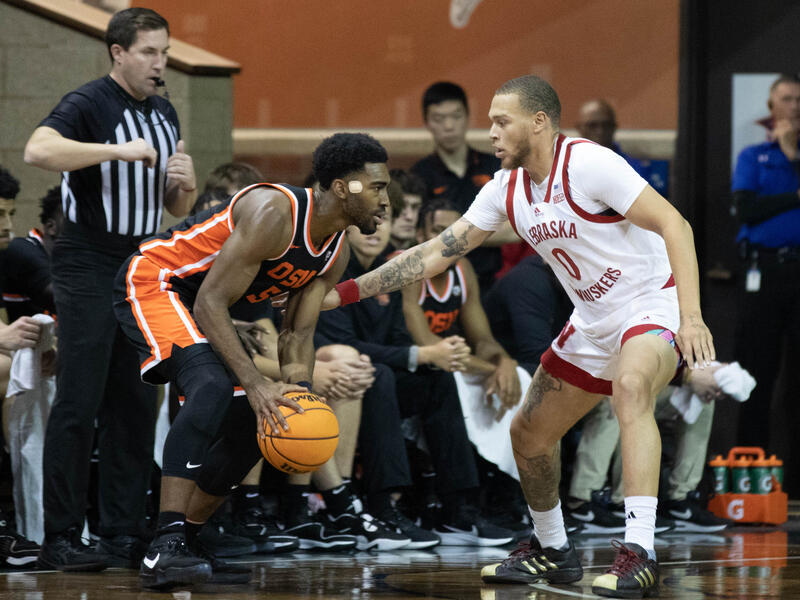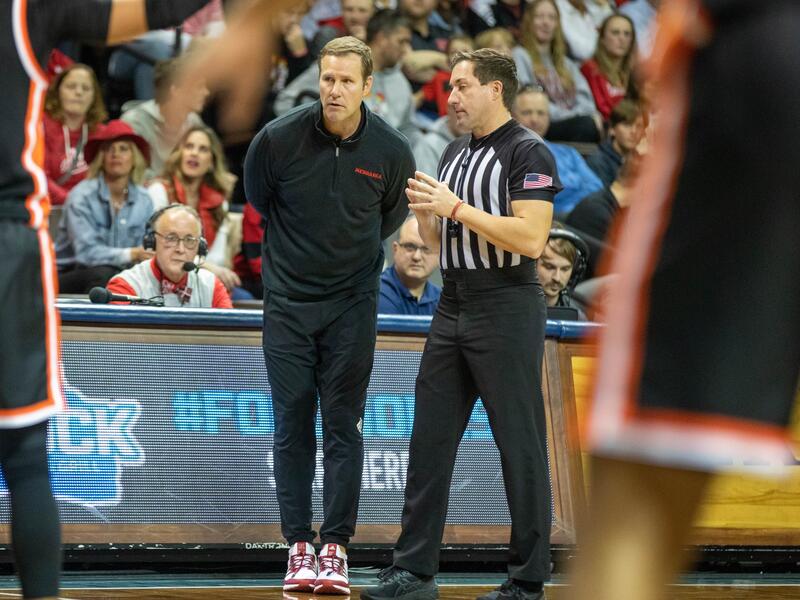Kelly Pfeifer’s quest to become a better basketball official went outside conventional boundaries when he contacted a neuropsychologist about ways he could get better at what he does.
Josefine Combs, Psy.D., is the medical director of concussion services at Sanford Health who works with athletes and nonathletes in evaluating and treating head injuries. She also offers sports psychological services to all ages and all skill levels.
She is an important part of a Sanford Health team that assists athletes, coaches and nonathletes at every level with developing and maintaining a strong mental approach.
Dr. Combs’ work can help with things like boosting confidence, developing leadership skills and managing stress.
Get in the game: Personal and team fitness with Sanford Sports
Her work with Pfeifer, a top-level referee who works major-college nationally televised men’s basketball games all over the United States, began with the official seeking out “sports mental training” on the internet. Dr. Combs’ name came up and the referee quickly made the call.
First-time teamwork
Their conversations would represent new territory for both. They would each later say they became better at what they do based on their collaboration.
“I had never done anything like this and she had never worked with a referee before,” said Pfeifer, who lives in Mitchell, South Dakota, and grew up in Philip. “I’d heard a lot about athletes getting involved in mental training to make them more focused. I wondered if some of that same training could help me.”
Pfeifer had a lot of questions: What is this all going to entail? What are we going to talk about? What can you do to make me a better referee?
Dr. Combs had questions, too: What goes into being a good referee? What parts of refereeing do you find most difficult? How are you managing the obvious stress involved?

Dr. Combs does not wear a whistle at work and Pfeifer does not interrupt games to have sit-down sessions with coaches, but referees and sports psychologists both deal with the intensity of competition and how it affects people.
“From an athlete’s perspective, they want to work on their focus, work on goal-setting and concentration — they want to be able to stay in the moment but not get too excited,” Dr. Combs said. “A lot of that applies to referees. They have to get really good at sustaining their attention. They’re multitasking — they pretty much have to be watching everything and pay attention to all of it.”
Even if every call a referee made was technically the right one, and even if those decisions did not also involve robust public scrutiny, the job of officiating a basketball game would not be easy.
‘Manage major moments’
So when Pfeifer says he wants to become a better referee, he knows that perfection is more of a dream than it is an actual attainable goal. Nevertheless, there are lines you don’t want to cross if you’re a referee. Anything you can do to make it less likely you’ll go outside those boundaries is a constructive step forward.
“When you’re dealing with high-profile basketball games on national TV, you don’t want your call to be the lead story on SportsCenter that night,” Pfeifer said. “You have to manage major moments. You have to stay calm and keep everyone else calm when there is chaos.”
Dr. Combs did her part to help Pfeifer avoid being the center of attention on ESPN. Not so surprisingly, it involved a lot of the same conversations and mental exercises she uses with athletes.
During one of their first sessions, Dr. Combs engaged Pfeifer in a mindfulness technique, asking him to identify five things in her office. He responded with the five very quickly.
“She told me my brain works fast,” Pfeifer remembers. “She said ‘I guess it has to when you’re officiating.’ Then she told me that sometimes it also has to slow down.”
Practicing mindfulness midgame
Slowing down in Pfeifer’s work can mean slicing a 40-minute basketball game into manageable increments. College basketball has a lot of media timeouts built into a game — in addition to the timeouts the teams call on their own. These breaks can provide opportunities for referees to recharge their brains.
“During media timeouts now, I might ask myself what I’m seeing,” Pfeifer said. “My answers will be pretty basic — I’ll look at the scoreboard and I’ll be like ‘OK, the score is 19 to 18 and one team has two fouls and the other has one.’”
The next break the question might be “How do I feel?” and Pfeifer would come up with the answers.
“My answer might be ‘Alright, this game is going smooth,’” Pfeifer said. “’I’m calm. I’m not tired.’ The next time it might be ‘What am I hearing?’ And it would be the crowd and the band. The next time it might be ‘What am I smelling?’ and then ‘What am I tasting?’”
It’s a routine Pfeifer began using after his work with Dr. Combs. The intention is to get as mentally ready as is possible for whatever comes next on the basketball court.
“Basketball referees need to be focused for the full 40 minutes, not 25,” Pfeifer said. “So you end up telling yourself, ‘Let’s go out in the next five or six minutes and be really focused.’ Then the next time you’re down to 3:23 left in the half, and you think to yourself, ‘I need to be good for the next 3:23.’ Then it’s halftime and we get a chance to reset everything again.”

Photo by Jay Pickthorn, Sanford Health
Confidence in making calls
It could be viewed as a form of preventive medicine. Being in a good spot mentally will not guarantee that no one questions his decisions, but it can put him in a better spot to make a regrettable call less likely.
“It is usually very motivated, gifted people who seek out these kinds of things whether they’re athletes or not,” Dr. Combs said. “The work we did together allows him to capitalize even more on his amazing talent for officiating. It allows him to utilize it more consistently. It’s a form of fine-tuning. He’s doing all the work; I’m just giving him a couple extra tools that help him do it even better.”
Communication might be the most valuable tool a referee has, especially when emotions are running high. A knack for clarity and consistency with coaches, players and the rest of the officiating crew is essential to managing a game effectively.
“It’s not just what a referee says. It’s how they say it,” Dr. Combs said. “A lot of their communication is nonverbal: How do I present myself? How do I display the confidence that I have in my skills to communicate to the coaches? How do I tell people that they’re not going to talk me out of my decisions because I know what I’m doing?”
Pfeifer’s start on an officiating career began when his basketball coach at Dakota Wesleyan, the late Doug Martin, encouraged him to stay in the game as a coach or a referee.
Pfeifer started off officiating high school players’ summer camps and then kept moving up, accompanied by specific goals. He quickly impressed his superiors in the business and kept getting hired.
“At some point, it kind of snowballed,” Pfeifer said. “It’s been a great ride and I want to keep going with it.”
Mental health is health
Pfeifer’s wife, Ashley, and their three children can watch him on television on a given night. It’s not such a big deal these days given that it might happen a couple times a week, but occasionally they’ll ask him about something they saw and he’ll do his best to explain what it was like.
Related: Sanford Pentagon joins campaign to stop ref abuse
It’s a reminder that referees are real people with lives off the court. When a sports psychologist like Dr. Combs is helping a basketball official become better at what they do, they’re trying to help with everything, not just the charging calls.
“If everybody is treating mental health like we might go see a dentist for a checkup every six months, we can catch a lot of things before they become problematic,” Dr. Combs said. “Then we’re not going in for a root canal because we addressed it before it got to that point. The kind of visits like Kelly has can be very beneficial. It can actually be fun — you don’t need a crisis to come in. You just enjoy it and get something out of it.”
A generation ago, Pfeifer would have hesitated to share with his peers that he was in conversation with a sports psychologist. Thankfully, that era has passed. In fact, he welcomes those conversations now.
“Dr. Combs has got a really great personality — she’s very understanding, and it was obvious in our conversations she had done her homework about officiating,” Pfeifer said. “I’m very thankful I worked with her because the things she helped me with I’m able to use every game.”
Learn more
- Sports psychology helps athletes, coaches on & off the court
- Mandan H.S. launches Sanford Sports psychology program
- Neuropsychologist plays vital role in concussion recovery
…
Posted In Basketball, Behavioral Health, Brain & Spine, Sanford Sports, Sports Medicine
